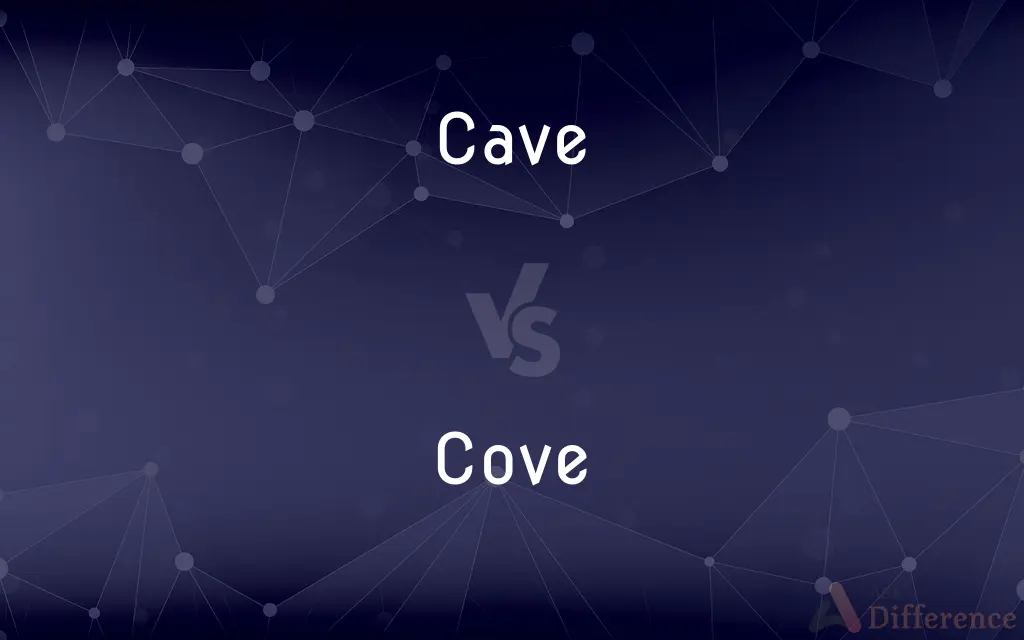Cave vs. Cove — What's the Difference?
By Tayyaba Rehman — Updated on November 6, 2023
A cave is a natural underground space, while a cove is a small, sheltered bay on a coastline.

Difference Between Cave and Cove
Table of Contents
ADVERTISEMENT
Key Differences
Caves are natural underground spaces, often in mountains or cliffs, that are large enough for a person to enter. The formation of a cave is typically due to natural processes such as the weathering of rock and often extends deep underground. Caves can be made of various types of geological materials including limestone, which is known for creating vast networks of caves.
Coves, by contrast, are small coastal bays with restricted entrances, often formed by the sea's erosion of softer rock along the shoreline. They are recognized for being more sheltered than surrounding shores, with calmer waters that are often clearer, making them ideal for anchorage or swimming.
The term "cave" can also metaphorically describe any space that feels enclosed and dark, such as a room that is secluded and not well-lit. In literature, caves often symbolize isolation or the subconscious. Caves have played crucial roles in human history, often serving as shelters for prehistoric people and as sites for ancient rituals.
"Cove" doesn't carry the same metaphorical weight but can describe a man-made shelter similar to the natural form. In nautical terms, cove can also refer to a recess or a nook along the coastline, but it lacks the historical and psychological associations of caves. Coves are frequently found in tourist destinations, appreciated for their natural beauty and sometimes hidden charm.
Caves can be found away from water bodies, unlike coves which are part of the coastal landscape. While caves are often explored for their geological formations, archaeological significance, or as recreational destinations, coves are enjoyed for their aesthetic appeal and recreational opportunities related to the sea, such as boating, fishing, and swimming.
ADVERTISEMENT
Comparison Chart
Definition
A natural underground chamber
A small, sheltered bay or coastal inlet
Location
Typically inland, in mountains or cliffs
Along coastlines
Formation
By geological processes
By the erosion of rock by the sea
Association
With geology and archeology
With nautical and recreational activities
Shelter
Can provide shelter underground
Provides sheltered anchorage for boats
Compare with Definitions
Cave
A den or hideout, often used in a metaphorical sense.
She called the cluttered office her cave where she found inspiration.
Cove
A concave architectural feature, often referring to ceilings.
The cove ceiling in the library added to its grandeur.
Cave
A cave or cavern is a natural void in the ground, specifically a space large enough for a human to enter. Caves often form by the weathering of rock and often extend deep underground.
Cove
A small coastal inlet, especially one with a narrow entrance.
Their boat was anchored safely in the cove.
Cave
A natural underground chamber in a hillside or cliff
The narrow gorge contains a series of prehistoric caves
Cove
A sheltered bay on the coastline.
We spent the afternoon sunbathing in the secluded cove.
Cave
Explore caves as a sport
They say they cave for the adventure, challenge, and physical exercise
Cove
A niche or a safe spot, particularly by the sea.
The tiny cove was their secret meeting place by the ocean.
Cave
Capitulate or submit under pressure; cave in
He caved because his position had become untenable
She finally caved in the face of his persistence
Cove
A cove is a small type of bay or coastal inlet. Coves usually have narrow, restricted entrances, are often circular or oval, and are often situated within a larger bay.
Cave
(among children) look out!
Cove
A small sheltered bay in the shoreline of a sea, river, or lake.
Cave
A hollow or natural passage under or into the earth, especially one with an opening to the surface.
Cove
A recess or small valley in the side of a mountain.
Cave
A storage cellar, especially for wine.
Cove
A cave or cavern.
Cave
To dig or hollow out.
Cove
A narrow gap or pass between hills or woods.
Cave
To cause to collapse or fall in. Often used with in
The impact caved in the roof of the car.
Cove
A concave molding.
Cave
To fall in; collapse. Often used with in
The walls caved in during the earthquake.
Cove
A concave surface forming a junction between a ceiling and a wall. Also called coving.
Cave
To give up all opposition; yield. Often used with in
The school committee caved in to the demands of parents.
Cove
A fellow; a man.
Cave
To explore caves.
Cove
To make in an inward curving form.
Cave
A large, naturally-occurring cavity formed underground or in the face of a cliff or a hillside.
We found a cave on the mountainside where we could take shelter.
Cove
A hollow in a rock; a cave or cavern.
Cave
A hole, depression, or gap in earth or rock, whether natural or man-made.
Cove
(architecture) A concave vault or archway, especially the arch of a ceiling.
Cave
A storage cellar, especially for wine or cheese.
This wine has been aged in our cave for thirty years.
Cove
A small coastal inlet, especially one having high cliffs protecting vessels from prevailing winds.
Cave
A place of retreat, such as a man cave.
My room was a cozy cave where I could escape from my family.
Cove
(US) A strip of prairie extending into woodland.
Cave
(caving) A naturally-occurring cavity in bedrock which is large enough to be entered by an adult.
It was not strictly a cave, but a narrow fissure in the rock.
Cove
A recess or sheltered area on the slopes of a mountain.
Cave
(nuclear physics) A shielded area where nuclear experiments can be carried out.
Cove
(nautical) The wooden roof of the stern gallery of an old sailing warship.
Cave
Debris, particularly broken rock, which falls into a drill hole and interferes with drilling.
Cove
(nautical) A thin line, sometimes gilded, along a yacht's strake below deck level.
Cave
(mining) A collapse or cave-in.
Cove
A fellow; a man.
Cave
The vagina.
Cove
A friend; a mate.
Cave
A group that breaks from a larger political party or faction on a particular issue.
Cove
(architecture) To arch over; to build in a hollow concave form; to make in the form of a cove.
Cave
(obsolete) Any hollow place, or part; a cavity.
Cove
To brood, cover, or sit over, as birds their eggs.
Cave
(programming) A code cave.
Cove
A retired nook; especially, a small, sheltered inlet, creek, or bay; a recess in the shore.
Vessels which were in readiness for him within secret coves and nooks.
Cave
To surrender.
He caved under pressure.
Cove
A strip of prairie extending into woodland; also, a recess in the side of a mountain.
Cave
To collapse.
First the braces buckled, then the roof began to cave, then we ran.
Cove
A concave molding.
Cave
To hollow out or undermine.
The levee has been severely caved by the river current.
Cove
A boy or man of any age or station.
There's a gentry cove here.
Now, look to it, coves, that all the beef and drinkBe not filched from us.
Cave
To engage in the recreational exploration of caves.
I have caved from Yugoslavia to Kentucky.
Let's go caving this weekend.
Cove
To arch over; to build in a hollow concave form; to make in the form of a cove.
The mosques and other buildings of the Arabians are rounded into domes and coved roofs.
Cave
(mining) In room-and-pillar mining, to extract a deposit of rock by breaking down a pillar which had been holding it in place.
The deposit is caved by knocking out the posts.
Cove
To brood, cover, over, or sit over, as birds their eggs.
Not being able to cove or sit upon them [eggs], she [the female tortoise] bestoweth them in the gravel.
Cave
To work over tailings to dress small pieces of marketable ore.
Cove
A small inlet
Cave
(obsolete) To dwell in a cave.
Cove
Small or narrow cave in the side of a cliff or mountain
Cave
Look out!; beware!
Cove
A recess or small valley in the side of a hill or mountain.
A hidden cove on the mountainside was the perfect spot for their picnic.
Cave
A hollow place in the earth, either natural or artificial; a subterraneous cavity; a cavern; a den.
Cave
Any hollow place, or part; a cavity.
Cave
A coalition or group of seceders from a political party, as from the Liberal party in England in 1866. See Adullam, Cave of, in the Dictionary of Noted Names in Fiction.
Cave
To make hollow; to scoop out.
The mouldred earth cav'd the banke.
Cave
To dwell in a cave.
Cave
To fall in or down; as, the sand bank caved. Hence (Slang), to retreat from a position; to give way; to yield in a disputed matter.
Cave
An underground enclosure with access from the surface of the ground or from the sea
Cave
Hollow out as if making a cave or opening;
The river was caving the banks
Cave
Explore natural caves
Cave
A large, hollow space in the ground, usually natural.
The explorers discovered a cave hidden behind the waterfall.
Cave
A space that is dark and secluded.
He set up a small workshop in the cave of the garage.
Cave
An underground chamber or cavity in the earth.
Stalactites and stalagmites adorned the inside of the limestone cave.
Cave
A place providing refuge or seclusion.
During the storm, they took refuge in a bear's cave.
Common Curiosities
Can caves form under water?
Yes, there are underwater caves, also known as submerged caves.
What defines a cave?
A cave is a natural underground space large enough for a human to enter.
What is a cove in architecture?
It's a curved molding or a recess in a ceiling.
Are coves safe for swimming?
Coves are often safer due to their sheltered nature, but caution is always advised.
What wildlife might I see in a cove?
Coves may host various marine life, including fish, crabs, and birds.
Are all caves dark?
The innermost parts of caves are typically devoid of natural light.
Is a cove a good place for boats?
Yes, because it provides shelter from wind and waves.
Is a cove always part of a sea or ocean?
Typically, yes, a cove is a small, sheltered part of the coast.
Can caves have their own ecosystem?
Yes, some caves support unique ecosystems.
Do caves always have an opening?
Most caves have at least one natural opening, though some may be inaccessible.
Can coves be formed by rivers?
Coves are primarily formed by ocean activity, but river coves can exist in certain landscapes.
What is the difference in the waters of a cove?
Waters in a cove are usually calmer due to the sheltered environment.
Can a cave be man-made?
Yes, there are man-made caves, but naturally occurring caves are most common.
Are caves cold?
Caves often maintain a consistent temperature that can be cooler than the outside.
Do coves have beaches?
Many coves have beaches, but not all.
Share Your Discovery

Previous Comparison
Amusing vs. Funny
Next Comparison
Revive vs. RevitalizeAuthor Spotlight
Written by
Tayyaba RehmanTayyaba Rehman is a distinguished writer, currently serving as a primary contributor to askdifference.com. As a researcher in semantics and etymology, Tayyaba's passion for the complexity of languages and their distinctions has found a perfect home on the platform. Tayyaba delves into the intricacies of language, distinguishing between commonly confused words and phrases, thereby providing clarity for readers worldwide.














































